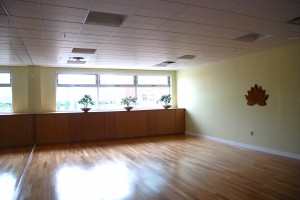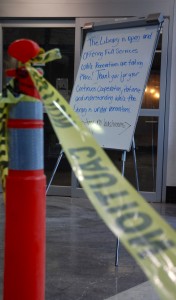What’s it like to go speed dating?
November 1, 2010 by Jocelyn Gollner · Leave a Comment
I hadn’t really on going to the KSA’s speed-dating event, but decided to after one of my fellow single friends suggested that it might be fun to see what it was all about.
Conveniently, she “forgot” to sign up in time so I decided to go solo. I had never been speed dating before, so I was nervous: What if we had nothing to talk about? What if they were all freaks?
When I signed in at the Grassroots Cafe around 4 p.m. on Oct. 21, I was given a name tag, an ice-breaker question sheet and a pen.
Instructions on the ice-breaker sheet ranged from “Find someone who speaks three languages” to “Find someone who has worked at McDonalds.”
Normally, I absolutely hate ice-breaker exercises. They seem like a forced way to get people to talk to each other. In this situation it wasn’t too bad, though. People were friendly and the ice-breaker seemed to relax them.
Once the ice-breaker was over, everyone went to sit at a previously assigned table, which was appropriately decorated with black tablecloths and little candles. The speed dating began.
Each female person was allotted five minutes with spend with each male person. You talked, found out a little bit about the other person, and decided if you had a connection or not. If you thought you would like to see the person you were talking to again, you would write “yes” beside their name in a booklet everyone was given before the dating. If you didn’t really feel a connection with the person, you had to write “no” beside their name.
Once the five minutes was up, the guys would rotate to the next table and a new date would begin.
It was actually interesting to talk to all of the guys. Everyone seemed really down to earth, which was nice.
I had thought that I would be getting the “He’s so creepy, get me out of this situation NOW” thought, but I didn’t.
(Of course, the nice thing with speed dating is that even if you do get that he’s-creepy-get-me-the-hell-out-of-here vibe, you only need to spend five minutes talking to them. You don’t need to have your friend call you and fake a family emergency.)
Not every guy that I talked to was the type of guy that I would date, but talking to them for five minutes was fine. Fun even.
At the end of the event, we all handed in our booklets with the names of the people we would like to see again. It was then the organizers job to look to see if both people felt a mutual connection. If there was a match, they would send out the other’s contact information to each participant.
I got an e-mail from the organizers at the Speed Dating event the other day, telling me that there was no mutual connections for me this time.
That’s fine. I had a good time at the event and don’t regret going.
If your one and only concern is coming out of the speed dating with a date lined up, you may be disappointed. But if you go with the intent to meet some interesting fellow Kwantleners, and maybe get a date in the process, you’ll have a good time regardless of the outcome.
When the next Kwantlen speed dating event comes around, I’ll be letting my single friends know where to go to find a potential date, or, if not that, spend a fun couple of hours.
RELATED: Students turn out for speed dating at Kwantlen
The new age of breakups
October 12, 2010 by Jocelyn Gollner · Leave a Comment

Social media, such as Facebook, is affecting many aspects of our lives, such as how we breakup. (Photo by Jocelyn Gollner)
By Jocelyn Gollner and Amanda Punshon
In today’s age of social networking, sites such as Facebook and Twitter have become such a part of our lives that they even affect our break-ups.
“I hear very often that [people] meet on eHarmony or someplace like that. And so how they come together is kind of based on this artificial information that they have about each other,” said Bruce Bailey, a counsellor at Kwantlen Polytechnic University. “Instead of connecting, they just kind of… miss… just a bit at the beginning, and then they never really quite figure out how to build [a relationship.]“
Bailey said one of the main reasons that couples have trouble connecting is a lack of face-to-face contact. Tweeting and emailing replace actual conversations, and it’s harder to forge an attachment.
Without that initial connection, the relationship can start to fall apart, and once it does, people often choose to end things using social networking.
“Before the social media that we have, people would either call or break up in person. Maybe it’s a reflection of my age, but I’m a little surprised that people can text one another and break up that way,” Bailey said.
He said that despite the volume of communication that goes on via social networking, “the sense that I have, and this isn’t the least bit scientific, is that social media has left us completely exposed to the whole world.”
‘It’s like a pack of wolves
Alicia Con, a Kwantlen student, agreed.
“If you put it on Facebook it’s like a pack of wolves,” she said. “You’re basically setting yourself up for that. If you’re a more social person, and then once you break up, everyone’s like ‘Oh what happened, what happened, what happened?’ I think, just from previous experience, I’ve just learned not to put stuff like that up on Facebook. Because even if you take your status down, people are like ‘Oh are you dating someone?’ So it’s kind of giving people the opportunity to be really nosy.”
Peter Chow-White, assistant professor in the School of Communication at SFU, however, said that social media is often used in “finding out information about partners who may not be behaving monogamously.”
It’s a trend that Kwantlen counsellors and students have noticed as well.
“I find that young women will monitor the computer activity of their boyfriend,” Bailey said. “That’s a real issue — the whole ‘I don’t trust him. What should I do?’ And she’s not quite sure whom he’s talking to…[women] don’t like that.”
“If a girl or a guy sees a picture on Facebook or something of their boyfriend or their girlfriend with someone else, it could lead to a breakup,” said Amit Aujla, a Kwantlen student.
A cautuon against Facebook-creeping
It’s not just people who are dating who monitor each others’ online profiles. Exes are often just as nosy.
“One of my favourite comments from one of my students is that ‘my boyfriend and I broke up and then I saw that he friended his ex-girlfriend and I totally lost my…’ you know, fill in the blank,” said Chow-White.
Bailey cautioned against this so-called “Facebook creeping,” saying that while it mirrors what some older women do — namely, hiring a private investigator to make sure their partner isn’t lying — it’s “a little less valid, because a private investigator is trained and simply gets the information that they come across…an awful lot on Facebook is not true, necessarily, so checking him out is not necessarily checking him out.”
If you can’t seem to restrain yourself from creeping on your ex, there are online sites to help.
Blockyourex.com is a way for people to curb their Facebook-creeping habits. They enter their exes name, Facebook and Twitter account info and the URL of their blog, and then they can’t access any of their online information.
Another on-line site full of social media info and advice is Allfacebook.com. The self-proclaimed “Unofficial Facebook Resource,” provides satirical tips to help you “protect your emotional well-being.”
Tips include taking note of all your exes new friends (“this will provide you with more stalker material to draw false conclusions from,”) posting photos with members of the opposite sex (“by posting photos with others, you demonstrate that the relationship meant nothing to you [even though it clearly did],”) and applying new privacy settings (“while you may want your ex to see photos of you with a cute new romantic interest, you probably don’t want them to see the photos of the drunken stupor you got into last night.”)
Kwantlen students dreaming of more sleep
October 3, 2010 by Jocelyn Gollner · Leave a Comment

Many students are not getting the recommended 8 hours of sleep per night. (Photo by Jocelyn Gollner)
Kwantlen students may not be getting the sleep that they need.
The average amount of sleep that Kwantlen students get each night is six hours, based on an interview with 15 students. According to Dr. Najib Ayas, a member of the Sleep Disorders Program at UBC, students should be getting about eight.
Without a proper amount of sleep, Ayas says that “ your cognition won’t be as good, so you won’t be as alert. And you won’t be able to learn as well.”
If that doesn’t persuade you to get more sleep, he also says that sleep deprivation “affects your appetite hormones and that can actually lead to weight gain.” But with school, work, relationships, family commitments, sports, etc., getting more sleep can be easier said than done.
“I get like six or seven hours of sleep,” said Jennifer Chong, a student at Kwantlen. “If it were my choice I would get way more. Then I would feel way more relaxed.”
When asked what prevents her from getting more sleep, she said it’s mostly studying.
Jina Seo, a design student, also gets about six hours of sleep each night. Does she feel that that is enough?
“No, of course not,” she said.
RELATED: Stress relief for students is a no-brainer
Extreme Makeover: Kwantlen library edition
September 25, 2010 by Jocelyn Gollner · Leave a Comment
The library at the Kwantlen Richmond campus is getting an overhaul, undergoing a $1.2-million reconstruction project, partially funded by the Knowledge Infrastructure Project (KIP).
(KIP is part of Canada’s Economic Action Plan, and will spend $2 billion over two years to repair and expand colleges and universities across the country. In B.C., KIP is spending more than $230 million on 44 post-secondary institutions.)
Some of the improvements to the Kwantlen Richmond library will include more computer stations, more seating, more study rooms, a new copy room and a new information desk.
“I just think it will be an amazing transformation,” said Cathy MacDonald, the University librarian. “It will just be much more updated.”
The library at the Kwantlen Richmond campus is one of three projects at Kwantlen Polytechnic University partially funded by KIP. The other two projects are various student services renovations at the Langley campus and a partial building replacement at the Surrey campus.
The Kwantlen Richmond library is still open during renovations, but if you are looking for a quiet place to study, don’t go in the morning.
“[The contractors] are going to try to do much of the noisy drilling before 8 a.m.,” MacDonald said.
As well, the washrooms are not available for use in the library.
The renovation project is expected to be finished before the end of December.
“We had a report today that they are right on schedule,” MacDonald said.
More details about the library reconstruction are available at the college website.
Note: This article was updated, with quotes from Cathy MacDonald, on Sept. 30, 2010.
September 18, 2010 by Jocelyn Gollner · Leave a Comment The Kwantlen yoga studio at the Richmond campus is one of Kwantlen's several recreational facilities. (Jocelyn Gollner photo) After a summer full of barbecues and beer, it’s time for students to get back in shape. But the question is where to go? We asked 10 students at the Kwantlen Surrey campus where they most frequently went to for exercise, and if they used Kwantlen’s exercise facilities. (Kwantlen has a yoga studio at the Richmond campus and a gymnasium and fitness centre at the Surrey campus.) Out of the 10 people questioned, only one uses Kwantlen’s facilities. “If [Kwantlen’s recreational facilities] were included in the student fees, then I’d definitely go, but if it’s not then I’ll figure out some other way that’s much cheaper,” Lindsey Neill, a general arts student at Kwantlen, said. Kwantlen charges students (taxes included) $5.25 for drop-in sessions at the gym, $15.96 for a month pass, $42.56 for a three-month pass, or $127.68 for an annual pass. In comparison, student rates at the Walnut Grove Community Centre in Langley (taxes not included) are $3.12 for drop-in, $34.43 for a one-month pass and $93.90 for a three-month pass. There’s no student discount for the centre’s $369.75 one-year pass. Manjot Thyar, a business management student at Kwantlen, doesn’t think students should pay to use the gym at Kwantlen because “we are already paying for tuition and we don’t have a lot of money. We take out student loans and we have to work and whatnot.” Despite the expenses that kinds of exercise demand, some students are still willing to pay. David Lee, a student taking ESL courses at Kwantlen, is involved in Kendo, which is a martial art. “It’s pretty expensive, though,” Lee said. “It’s $300 a month.” March 3, 2010 by Jocelyn Gollner · Leave a Comment Now I truly know what Canada is all about. The 2010 Winter Olympics in Vancouver turned out to be about much more than sports. It was about national pride. In all of my 18 years living in Vancouver, I have never experienced such Canadian patriotism. And quite simply, I loved it. Walk down the streets of Vancouver and you were bombarded with Canadian patriotism. Strangers in bright red jerseys and red woolen mittens gave out high fives and hugs simply because they were Canadian and proud of it. That, or the fact that they were drunk out of their minds: one or the other. Canadians have been criticized for not having an identity, and therefore not really having a sense of patriotism. But in the two weeks of the Olympics, I learned what being a Canadian means. It means hockey. I knew it was important to Canadians before the Olympics, but now I know why. It’s our game. And really, it’s not just a game, but rather a competition of cultures. You could tell whether we won or lost a game just by walking outside. There was a dark cloud hanging over the country when we lost to the U.S. in the quarter finals, and the most insane, positive energy when we won our gold medal against the U.S. It also means music. In the two weeks of the Olympics, I became proud of Canadian music. Seeing incredible acts like Sam Roberts, Arkells, Dan Mangan, We Are the City and Marianas Trench, made me realize what talented Canadian artists we have in our country. It is about feeling Canadian. Many times before Vancouver 2010, I think Canadians sometimes looked for inspiration and identification through other countries. Now we know why we don’t have to. It may sound like I’m dramatizing the importance of the 2010 Vancouver Olympics, but something great happened in those two weeks. The country came together, and we got re-energized, re-inspired, re-introduced to Canada. I can confidently say that I now know what Canada is all about. And I love it! The price of getting in shape for back to school

Now I know Canada



